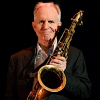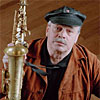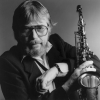Home » Jazz Musicians » Lennie Niehaus
Lennie Niehaus
Featured alto sax soloist and arranger for the famous Stan Kenton Orchestra, he has also recorded several albums of his own with jazz greats Mel Lewis, Shelly Manne, Jimmy Giuffre, Hampton Hawes and more.
Lennie has also been composer for numerous Clint Eastwood's films including Pale Rider, Unforgiven, The Bridges Of Madison County, Absolute Power, True Crime, Space Cowboys, and Bird, the award- winning tribute to legendary bebop artist Charlie Parker. In 1994 he won an Emmy for his score for the Showtime film Lush Life.
Lennie Niehaus admits that he “has every reason to be proud and happy”. In his early career he was acclaimed internationally as jazz altoist, composer and arranger (Stan Kenton and his own six albums as leader). Then, in these latter years, Lennie has garnered accolades as a leading Hollywood film composer. Yet he has always continued to utilise and expose his jazz background. This has culminated in his much-envied assignment as musical director and composer on the upcoming Charlie Parker Bird film, produced and directed by Clint Eastwood.
Lennie’s sister was a concert pianist and his father was an expert violinist. Père Niehaus started his son on violin at age seven. “I went from violin to oboe to bassoon,” Lennie recalled. “Then, at thirteen, I took up alto and clarinet.” He went on: “I was always interested in composing and writing; I wrote music as a young teenager. I had always heard advanced chords, listening to my sister and father play romantic era music.” In 1946, while still studying music at college, Lennie started his professional career, along with reedmen Herb Geller, Herbie Steward and Teddy Edwards. He went with the Stan Kenton orchestra for six months, and then was drafted into the Army in 1952. Discharged in 1954, he rejoined Kenton for five years.
“I left in 1959"I wanted to write. I came back to town (Los Angeles) to arrange for the King Sisters, Mel Tormé, Dean Martin and Carol Burnett.” It was in 1962 that Lennie started orchestrating for that great film composer Jerry Fielding, whose untimely death at a young age musicians still mourn. “I did about sixty or seventy TV shows and films for Jerry,” Lennie recalled. Since Fielding’s death, Lennie has been a leading film composer in his own right. “And I always do my own orchestrating. I always think orchestrally,” Lennie informed.
In films Lennie never forgets his jazz roots. He instanced: “The story of the film City Heat was cast in the ‘thirties. I wrote jazz of that period using people like altoist Marshal Royal. Bill Perkins came in and played like Lester. I had a jazz violinist who sounded like Stephane Grappelli. Then there was a boogie woogie sequence with three pianists Pete Jolly, Mike Land and producer Clint Eastwood.” In the last eight years Lennie had not played his alto at all. Today he’s back blowing, reportedly in top form, although he confessed: “Now I hear a little differently.” The Charlie Parker film, tentatively titled Bird, has just finished shooting. Release is expected for the Autumn.
Read moreTags
Stan Kenton: Salute!

by Jack Bowers
Stan Kenton, one of the most renowned and influential bandleaders of the twentieth century, died on August 25, 1979. Fortunately—for the sake of history in general and creative music in particular—Kenton's remarkable legacy lives on, and in a perceptive and open-minded world would endure forever. Even to this day, small but devoted groups of enthusiasts share a wish that some previously hidden array of his material might come to light, satisfiying for the moment their craving for more memorable music ...
Continue ReadingStan Kenton and His Orchestra: Concert on the Pacific

by Jack Bowers
The Stan Kenton Orchestra's Concert on the Pacific is actually a compendium of several concerts recorded between January and March 1958 at the Rendezvous Ballroom in Balboa, California—a series that almost emptied Kenton's wallet and caused him to pause and regroup a year or so later. While this was post-Rosolino/Sims/Konitz/Levey, the Kenton Orchestra was never without its share of outstanding soloists, in this case saxophonists Lennie Niehaus, Bill Perkins, Richie Kamuca and Bill Robinson; trumpeters Sam Noto, Billy Catalano and ...
Continue ReadingStan Kenton and His Orchestra: In a Lighter Vein

by Jack Bowers
Stan Kenton was a man of many moods, as was his intrepid and popular orchestra, which endured until his passing in August 1979 and whose renown is kept alive even today by the Stan Kenton Legacy Orchestra. Kenton dons his carefree hat on In a Lighter Vein, an assortment of straight-ahead themes from the orchestra's jazz library, preserved in five concert performances from 1953-55 beneath the umbrella of NBC radio's All Star Parade of Bands. Original compositions ...
Continue ReadingLennie Niehaus: Volume 5: The Sextet

by Craig Jolley
Lennie Niehaus is best known these days for his Hollywood film scores. He came up on the 1950's California scene and joined the Kenton band, replacing Lee Konitz as the primary alto soloist. After establishing himself as a player he began writing for the band as well. Simultaneously he led a series of fondly-remembered small band (5 to 8 pieces) recordings with other Kenton band members of the era.
These recordings were built around Niehaus' writing. His style was typical ...
Continue ReadingLennie Niehaus: Vol. 5: The Sextet

by AAJ Staff
The West Coast scene of the fifties produced few big names and ever fewer classic albums, but nevertheless provided fertile soil for some of the most stylish and consistent music in the history of jazz. For the most part, the artists working in the sunny climes of California were content to work within the established boundaries rather than extending them, keeping the art of arranging and sticking close to the melody vital at a time when most players were itching ...
Continue ReadingLennie Niehaus: Vol. 1: The Quintets

by David Rickert
Cool jazz has always represented the tweed jacket and horn-rimmed glasses approach to the music and has often been criticized for stealing jazz away from smoky bars to college lecture halls and living room hifis. A style that could only have been conceived during the optimistic bliss of the Eisenhower administration and the warm breezes of California, cool jazz was doomed to be overrun by the turbulent 60s and the angry, socially conscious music that was its byproduct. Indeed, cool ...
Continue ReadingJazz Musician of the Day: Lennie Niehaus

Source:
Michael Ricci
All About Jazz is celebrating Lennie Niehaus' birthday today!
Featured alto sax soloist and arranger for the famous Stan Kenton Orchestra, he has also recorded several albums of his own with jazz greats Mel Lewis, Shelly Manne, Jimmy Giuffre, Hampton Hawes and more. Lennie has also been composer for numerous Clint Eastwood's films including Pale Rider, Unforgiven, The Bridges Of Madison County, Absolute Power, True Crime, Space Cowboys, and Bird, the award- winning tribute to legendary bebop artist Charlie Parker. ...
read more
Jazz Musician of the Day: Lennie Niehaus

Source:
Michael Ricci
All About Jazz is celebrating Lennie Niehaus' birthday today!
Featured alto sax soloist and arranger for the famous Stan Kenton Orchestra, he has also recorded several albums of his own with jazz greats Mel Lewis, Shelly Manne, Jimmy Giuffre, Hampton Hawes and more. Lennie has also been composer for numerous Clint Eastwood's films including Pale Rider, Unforgiven, The Bridges Of Madison County, Absolute Power, True Crime, Space Cowboys, and Bird, the award- winning tribute to legendary bebop artist Charlie Parker. ...
read more
10 tracks: Niehaus and Brass

Source:
JazzWax by Marc Myers
With the recent passing of alto saxophonist and arranger-composer Lennie Niehaus, I spent yesterday listening to his Stan Kenton and sideman sessions and arrangements. During this period, Lennie used a wonderful device on up-tempo arrangements, opening with a heavy, dark riff and then cutting the cord and letting the song float into bright swing. On ballads, he used an effective inhale-exhale style that slowed the heart and captured the ear. Here are 10 brassy Lennie Niehaus arrangements: Here's one of ...
read more
Lennie Niehaus (1929-2020)

Source:
JazzWax by Marc Myers
Lennie Niehaus, a Los Angeles alto saxophonist and prolific composer for big bands and his own octet starting in the 1950s before moving on to television and Clint Eastwood-directed films, died May 28. He was 90. Lennie was one of the giants of the West Coast linear jazz sound. Along with Bill Holman, Shorty Rogers, Gerry Mulligan, Pete Rugolo and Dave Pell, Lennie arranged prolifically for West Coast small groups and big bands in the 1950s, introducing a new dynamic, ...
read more
Jazz Musician of the Day: Lennie Niehaus

Source:
Michael Ricci
All About Jazz is celebrating Lennie Niehaus' birthday today!
Featured alto sax soloist and arranger for the famous Stan Kenton Orchestra, he has also recorded several albums of his own with jazz greats Mel Lewis, Shelly Manne, Jimmy Giuffre, Hampton Hawes and more. Lennie has also been composer for numerous Clint Eastwood's films including Pale Rider, Unforgiven, The Bridges Of Madison County, Absolute Power, True Crime, Space Cowboys, and Bird, the award- winning tribute to legendary bebop artist Charlie Parker. ...
read more
Jazz Musician of the Day: Lennie Niehaus

Source:
Michael Ricci
All About Jazz is celebrating Lennie Niehaus' birthday today!
Featured alto sax soloist and arranger for the famous Stan Kenton Orchestra, he has also recorded several albums of his own with jazz greats Mel Lewis, Shelly Manne, Jimmy Giuffre, Hampton Hawes and more. Lennie has also been composer for numerous Clint Eastwood\'s films including Pale Rider, Unforgiven, The Bridges Of Madison County, Absolute Power, True Crime, Space Cowboys, and Bird... Read more.
Place our Musician of the Day widget on ...
read more
Jazz Musician of the Day: Lennie Niehaus

Source:
Michael Ricci
All About Jazz is celebrating Lennie Niehaus' birthday today!
Featured alto sax soloist and arranger for the famous Stan Kenton Orchestra, he has also recorded several albums of his own with jazz greats Mel Lewis, Shelly Manne, Jimmy Giuffre, Hampton Hawes and more. Lennie has also been composer for numerous Clint Eastwood\'s films including Pale Rider, Unforgiven, The Bridges Of Madison County, Absolute Power, True Crime, Space Cowboys, and Bird... Read more.
Place our Musician of the Day widget on ...
read more
Jazz Musician of the Day: Lennie Niehaus

Source:
All About Jazz is celebrating Lennie Niehaus' birthday today!
Featured alto sax soloist and arranger for the famous Stan Kenton Orchestra, he has also recorded several albums of his own with jazz greats Mel Lewis, Shelly Manne, Jimmy Giuffre, Hampton Hawes and more. Lennie has also been composer for numerous Clint Eastwood\'s films including Pale Rider, Unforgiven, The Bridges Of Madison County, Absolute Power, True Crime, Space Cowboys, and Bird...Featured alto sax soloist and arranger for the famous Stan Kenton ...
read more
Jazz Musician of the Day: Lennie Niehaus

Source:
Michael Ricci
All About Jazz is celebrating Lennie Niehaus' birthday today!
JAZZ MUSICIAN OF THE DAY Lennie Niehaus
Featured alto sax soloist and arranger for the famous Stan Kenton Orchestra, he has also recorded several albums of his own with jazz greats Mel Lewis, Shelly Manne, Jimmy Giuffre, Hampton Hawes and more... more
Website | Photos | Articles
Follow Lennie Niehaus
Put AAJ's Musician of the Day box on your website or ...
read more






























